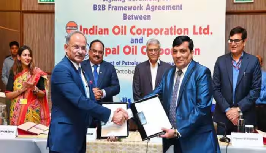State-owned, Indian Oil Corporation Limited and Nepal Oil Corporation (NOC) have signed a Business to Business (B2B) framework agreement for extension work of the Motihari-Amlekhgunj Petroleum Pipeline (MAPL) and oil storage terminals at Chitwan, as per a statement.
This agreement follows the Government-to-Government (G2G) Memorandum of Understanding (MoU) signed earlier between India’s MoP&NG and Nepal’s Ministry of Industry, Commerce and Supplies (MoICS) on May 31, 2023. The Motihari – Amlekhgunj Petroleum Pipeline (MAPL) is South Asia’s first transnational petroleum product pipeline, commissioned in 2019 to Chitwan, Nepal, as per the statement.
Under the agreement, both companies will construct oil storage terminals at Chitwan and a new transnational pipeline from IndianOil’s facility in Siliguri to Jhapa alongside an oil storage terminal at Jhapa.
During the event, Pankaj Jain said, “The existing pipeline from Motihari to Amlekhgunj being extended to Chitwan takes care of one part of Nepal, and the upcoming terminal at Jhapa is equally important given the challenges of Nepal being a hill state.” He remarked, “our GDP growth, for any country, will depend on the availability of affordable and reliable fuel. These pipelines will actually be ensuring that.”
V Satish Kumar, Chairman and Director (Marketing), Indian Oil, stated, “We are proud to strengthen the India-Nepal energy partnership through this B2B framework between Indian Oil and Nepal Oil Corporation. This collaboration builds upon the success of the Motihari-Amlekhgunj pipeline and paves the way for seamless energy connectivity, enhancing energy security for both nations.”
According to the statement, these projects are expected to transform petroleum logistics between the two countries. These pipelines have been designed to meet the future energy needs of Nepal, with ample storage capacity at both the Chitwan and Jhapa terminals, the statement added.
It further added that the collaboration is crucial for optimising the transportation of petroleum products, which will significantly reduce costs for Nepal Oil Corporation by minimizing reliance on tank trucks. Furthermore, the infrastructure is designed for mitigation of handling losses and environmental risks, alleviation of border congestion, and strengthening of Nepal’s energy security especially during natural disasters such as floods and landslides, the statement added.



